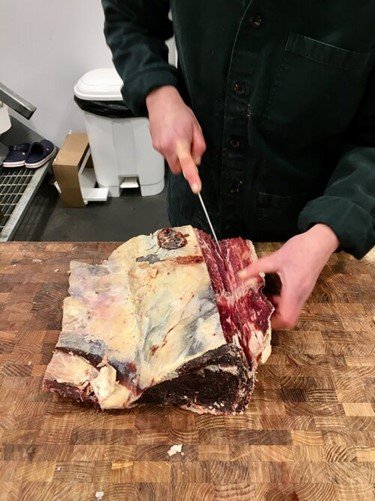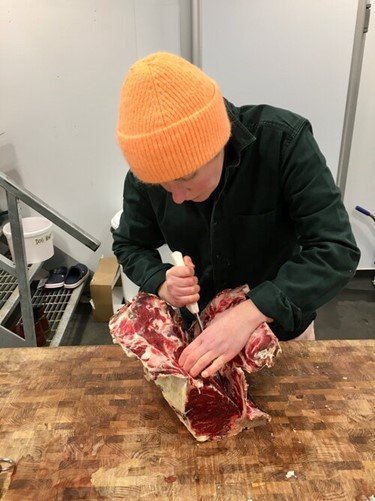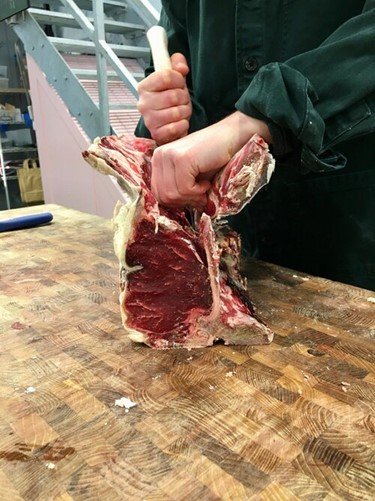Butchery at Bowhouse
By Lucy Hine
Beautiful herd. Around 750 hectares of Balcaskie Estate are dedicated to low-input livestock farming and are certified organic.
We thought it was about time we introduced you to another of our lovely neighbours at Bowhouse, and this time it's the turn of Sophie Cumber who runs the onsite organic butchery. We don't eat an awful lot of meat but when we do, recently it's been coming from Sophie. And what a treat it's been.
We went for a bit of a tour last week and a chat with Sophie to talk farming, animal husbandry, dry ageing, Sophie's path into butchery and her recommendations for best cuts, roasting joints and what to order for the all-important Christmas feasting.
Before deciding on butchery as her chosen path, Sophie, a self-confessed food obsessive and farmer's daughter, trained at Leiths School of Food & Wine in London. Following the introduction she got to butchery whilst at Leith's, Sophie went on to work at Barbecoa (Jamie Oliver's steak restaurant and butcher's shop, now closed) and then the celebrated Turner & George in Clerkenwell.
After 8 years learning her trade, honing her knife skills and building up those biceps, earlier this year Sophie made the permanent move from London to St Monans to take up the reins at Bowhouse, becoming Balcaskie Estate's* first butcher.
Around 750 hectares of Balcaskie Estate are dedicated to low-input livestock farming. The farm is fully organic (certified by the Soil Association) and uses a sustainable grazing method, which means that the herd is moved every day to a new bit of pasture, so they only eat the top layer of grass rather than disturbing the roots and soil.
Sophie has enjoyed working really closely with the farmers, seeing the animals in the field and reconnecting with the reasons she went into butchery in the first place in a way that wasn’t possible while she was working in the city.
All of the beef coming into the butchery is from the Estate, as well as the lamb, mutton and wild venison. When the meat arrives at Bowhouse from the abattoir (also in Fife), the carcasses are hung whole in the cold store next door to the butchery and left to dry-age for around 6 weeks. Dry-ageing is the process of leaving meat to age in a dry, climate-controlled environment, which effectively tenderises the meat by breaking down the muscle fibres and tougher tissues until the meat is buttery smooth and very full-flavoured.
You might notice large blocks of salt on the floor in the photo below and the big ceiling fans which are both designed to dry out the air and evenly disperse the temperature in the room.
Sophie said recently in an interview with the Scotsman's Catriona Thomson, "I want to butcher in a way that support good farming methods and I believe that whole carcass butchery is the way to do that so that the end product is treated with respect. I get in whole cows at a time, so I have to use it all, nose to tail. I try to get as many steak cuts as I can; Denver steak, flat iron, bavette plus another couple of cuts you can get out of the shoulder. I'm trying to show people, there are more than just ribeye, sirloin and fillet."
Note the blocks of salt on the floor, used to dry out the cold store.
Next door to the impressively-filled cold store, is the butchery itself, which is where Sophie works most of the time. On the day we visited, Sophie was breaking down a Lincoln Red sirloin. You can see her at work in the photos at the top of this blog. And just look at the meat. Lincoln Reds are traditional, native breeds that are hardy and can be outside all year. They finish really well on grass, which all adds up to more flavour.
There is now a counter at the front of the space which is open to the public every week, Thursday to Saturday from 10am till 2pm. The counter is always beautifully presented and packed with the most delicious meat, including things not yet mentioned, like organic chickens, lovely sausages and Sophie's own beef jerky (get the spicy one).
If you’re still stuck for Christmas gifts, there are great Lincoln Red beef boxes which would give a lucky recipient loads of interesting cuts (all organic and dry aged of course) for £125, plus delivery. She can also sort your Christmas turkey, if you get in there soon this week. If you can't get to Bowhouse, you can also shop with Sophie on the Open Food Network here throughout the year.
As more and more of us re-evaluate our relationship with food (and drink) and how we choose to shop, it's so exciting to have places like this butchery pop up next door to us. It represents everything that is great about a local foodchain fortifying itself and becoming more resilient (despite real antipathy and disinterest from Government, both Scottish and National, while we're on the subject). I guess this is something we've all had a lot of time to reflect on this year.
To be given the opportunity to treat meat (and fish) as items of real value rather than everyday staples and encouraged to question the provenance of everything we are eating. To try to buy just what we need and eat every bit of it. To choose local suppliers over national supermarket chains. And to try as often as possible to make delicious food that's good for us and good for our community. Surely we can't go that far wrong if we stick to these principals. At some point in the future, we might all be able to look back and know we were on the right side of the debate, trying to drive real, positive, long-term societal change through all of the small choices that we make on a daily basis.
Food and drink really is that important. Nourishing us and our children and our planet. Rather than pillaging the land and lining the coffers of those multinational businesses who make you shudder a little bit every time you have to deal with them.
We would highly recommend a visit to Sophie's shop when you're next at Bowhouse or next sitting there wondering what to have for your tea.
*Balcaskie Estate owns Bowhouse and rents space within its former cow sheds to each of its tenants. Bowhouse was established as a means of connecting local people to more local produce.






